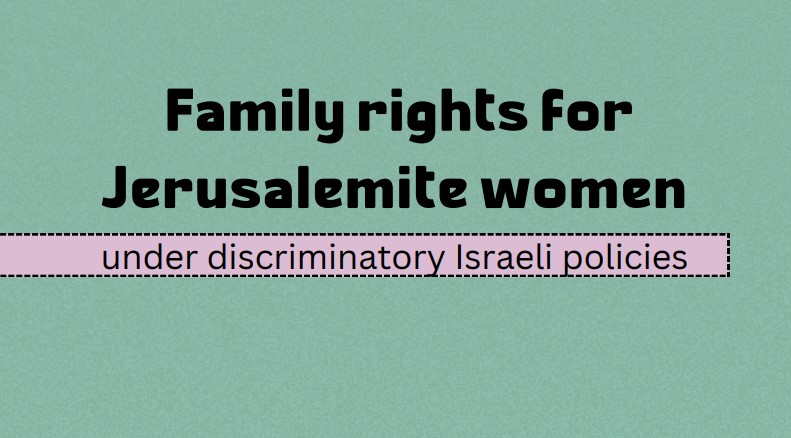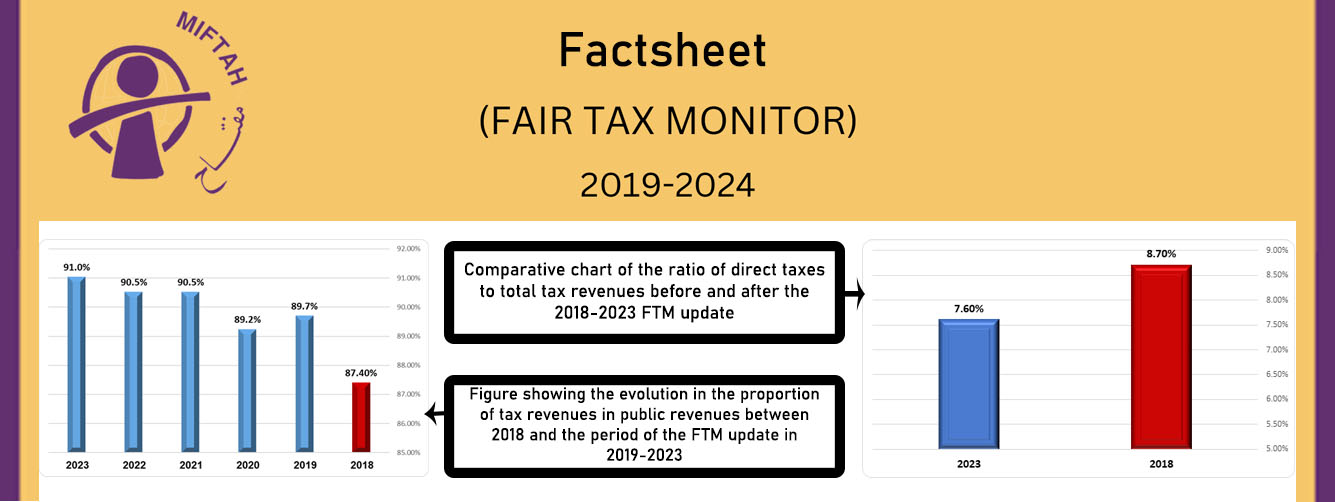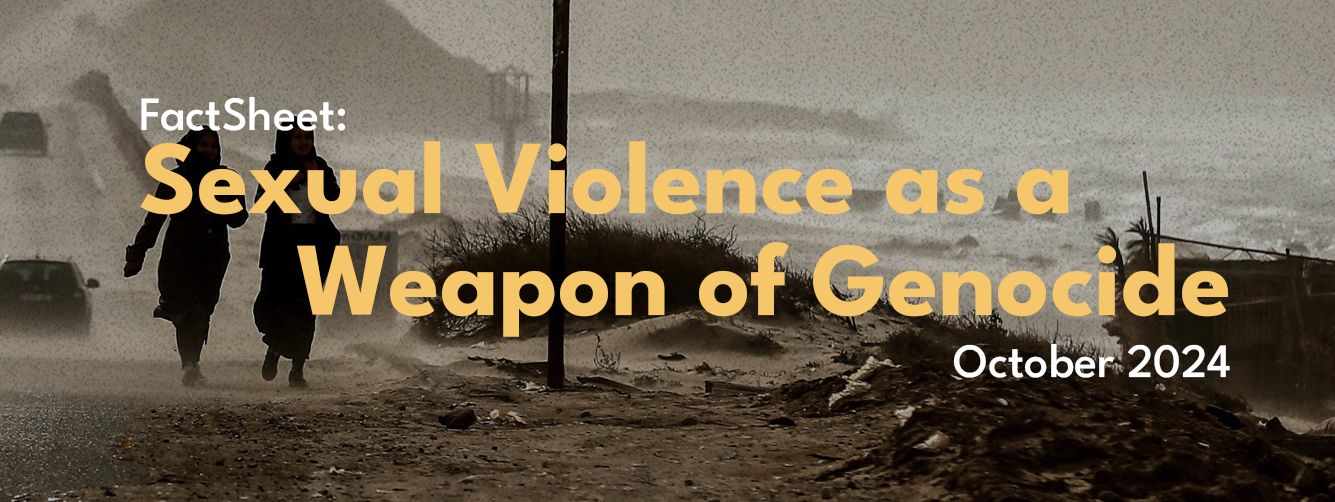
Introduction:
Israeli occupation authorities in Jerusalem continue to enforce punitive and discriminatory measures against Palestinians and to violate their human rights. These include: house arrest of minors, restrictions on the freedom of movement, ID revocation, forced displacement, home demolitions and rejection of family reunification applications, all of which have disproportionate impact on women, who endure the most responsibility in caring for the family.
Women with Palestinian IDs who are married to Jerusalemite ID holders are faced with numerous measures that restrict their movement, thus preventing them from exercising normal lives. Palestinian women, holding Palestinian IDs, in Jerusalem are prevented from living with their Jerusalemite husbands who have “blue IDs’ and, in the case of divorce, are also prevented from remaining in Jerusalem, putting them at risk of losing custody over their children, not living in the same city or even being able to visit them. This is because entry into occupied Jerusalem requires permits that can only be obtained with approval from Israeli authorities, particularly residency permits for women with Palestinian IDs.
These require renewal by their husbands, which is not feasible in the case of divorce.
These discriminatory Israeli measures towards Palestinian women based on their IDs, which in any case, is determined by Israeli authorities, is one reason for domestic violence. The accumulated hardships on women pose risks for them and oftentimes forces them to endure marital relations rife with violence. What makes matters worse is that they do not always report this violence for fear they will be deported from Jerusalem, lose custody of their children in the case of divorce, or have their residency revoked. This leads to further subordination and control by the husband over the fate of women in general.
Statistics:
- According to 2021 statistics from the Women’s Center for Legal Aid and Counseling (WCLAC), 70% of women who requested legal and social services in Jerusalem, have different IDs than their husbands, or West Bank IDs, which resulted in increased violence against them – neither are they able to secure court orders in their favor nor are they able to leave their husbands since they risk losing their children, which leaves them with they only option they feel they have: to remain in a violent cycle.
- In 2021, WCLAC, documented 120 cases on the impact of Israeli human rights and international humanitarian rights violations against women. One focus was on women in Jerusalem, especially pertaining to home demolitions, settler violence, access to services, ID revocations and forced displacement.
- Through this project, (2021-2022) 30 testimonies were collected and documented, of which 28 were adopted after selection and review. The testimonies included women’s issues (women voices) from various geographic area of occupied Jerusalem and its suburbs, including 16 women from Jerusalem neighborhoods such as Ras Amoud, Jabal Mukabber, Beit Hanina, Silwan, Sur Baher, Wadi Joz and Sawahra Sharqiya, 2 women from Beersheba, one woman living in Jordan, who is banned entry into Palestine and 10 women residing in the Old City of Jerusalem.
- The age group of women victims of racist policies, discriminatory laws and domestic violence was between 22-60 years of age. Their social status was as follows: 17 married, two widowed, one pending divorce, one separated and six divorcees.
- The center classified all of these issues as complex violations in that they entail domestic violence and Israeli discriminatory practices and law pertaining to women’s domestic rights and family reunification. Moreover, domestic violence usually entails husbands forcing women to forfeit their rights guaranteed in the marriage, including custody of the children, which is in contravention with CEDAW and national laws.
- Domestic violence includes physical and economic violence by the husband or any other family member such as a brother or father. It also includes forcing a woman into an early marriage and depriving her of the right to education. In this study, there were two cases of polygamy, one of which resulted in the wife being stripped of her right to citizenship and all other civil, social and economic rights. As for discriminatory laws and policies, these are represented in, but not exclusive to the “proof of residency” law and related policies, such as revocation of insurance, refusal to renew ID cards, ban on entry to Palestine and demolition orders (currently two cases).
- Over 40,000 family reunifications in Jerusalem have been rejected since the ratification of the ‘Citizenship Law” of 2003, which is a racist discriminatory law in violation of Article 9 (1) of CEDAW. This law is aimed at preventing residency or granting citizenship to any person from the Palestinian territories occupied in 1967 who is married to a Palestinian citizen with a Jerusalem ID or Israeli citizenship, thereby barring Palestinians from entering Jerusalem or areas inside the Green Line. This hinders women from living with their Jerusalem-ID husbands. If the woman is the Jerusalem ID holder and she moves to the West Bank to live with her Palestinian ID-holder husband, she is then at risk of losing her ID and being stripped of her rights, health insurance and social and educational security.
“Citizenship” Law:
- Israel passed a new Citizenship Law on March 10, 2022, meant to reinforce its apartheid system, with a majority of 45 to 15 votes and to restore most of the previous legislation from the 2003 Citizenship Law, which expired on July 6, 2021. At the time, the government coalition failed to secure the necessary majority for its renewal. (Jerusalem Legal and Human Rights Center, March 22, 2022)
- The law, in both its forms, stipulates the prevention of Palestinians in occupied Jerusalem or inside the Green Line from applying for family reunification for their spouses from the West Bank or Gaza Strip unless the husband is over 35 and the wife over 25. The ban includes residents and citizens from Syria, Iraq, Lebanon and Iran as well, which the law classifies as ‘hostile states.” Thus, According to Article 3 of the law, Palestinian women under 25 and men under 35 are prohibited from living with their spouses in Jerusalem or behind the Green Line. The law stipulates possible exceptions for ‘humanitarian’ reasons to be determined by a “humanitarian committee” appointed by the [Israeli] interior minister, on condition that these exceptions do not exceed 58 applications overall (irrespective of the overall number of applications), which is the number of exceptions already granted in 2018 (Article 7 z). Humanitarian reasons could include domestic violence (Article 7 c) or if one spouse holds Syrian citizenship and is married to a permanent resident of the occupied Golan Heights (Article 7 1). (Jerusalem Legal Aid Center statement, March 22, 2022)
- In the case a woman without a Jerusalem ID marries, any family reunification application submitted by her family (if they also hold Jerusalem IDs) is halted and her husband must reapply.
- Women who hold West Bank ID’s do not have the right to apply for family reunification. Only the husband who holds a Jerusalem ID or Israeli citizenship can apply, even if she meets all of the necessary requirements for the application and is capable of proving her place of residence.
- In the case of domestic problems, which result in divorce, the wife must reapply for family reunification via her family once again as long as the Israeli interior ministry does not hinder this application given that she is an adult of legal age.
Polygamy:
- Men who hold Jerusalem IDs or Israeli citizenship and who seek multiple wives, circumvent the law by divorcing the first wife in Israeli courts and then remarry her in Jordanian [Sharia] courts.
- If either the first or second wife has a Palestinian ID, Israeli law grants the right to register the children in the father’s ID if he who holds the Jerusalem ID, and not with the mother, which is often not in the child’s best interests.
Custody:
- If the mother is not granted family reunification, this makes it difficult for her to move around the city and follow up on her children’s affairs in official institutions in Jerusalem. If she does have family reunification, in most cases, the husband stops the application and deprives her of obtaining a residency permit, since custody issues are usually raised during marital disputes.
Alimony:
- If the wife or divorcee has a Jerusalem ID and the husband a Palestinian ID, the provisions for alimony are not applicable, which forces women to file alimony cases in Palestinian courts, the ceiling for which is much lower than in Israeli courts.
Problems in implementing Court Orders:
- If the husband or divorcee has a West Bank ID and resides in an area behind the annexation wall, even if these areas are under Israeli control, Israeli police do not enforce court orders. Instead, the Jerusalemite wife is referred to the liaison office. Oftentimes, Palestinian parties refuse to implement any orders issued by Israeli courts on the premise that they are foreign verdicts, which do not adopt the principle of reciprocity.
Statistics:
- According to information from the Israeli interior ministry, only five family reunification applications were not considered in 2014; in 2015 the number of pending cases rose to seven and in 2016, they dropped again to four. In 2017, the number of pending cases was also four and in 2018 there was a spike in this number, to 56, consistently rising in 2019 to 79. In 2020, the number of pending cases jumped
- to 574.
- WCLAC also offered support to a Jerusalemite woman activist living in Sheikh Jarrah, by training her to present her story to international delegations. On July 16, 2021, she, along with WCLAC, participated in a podcast with a Women’s International League for Peace and Freedom program. The episode revolved around the impact of war on women and girls in which she presented her experience during the recent events in Jerusalem’s Sheikh Jarrah neighborhood.
- In 2021 and beyond, WCLAC conducted a comprehensive eight-day training for two groups of women activists and intern Sharia lawyers in Jerusalem, targeting 26 women in all. Another training was held in the Hebron district, which targeted 16 women. The meetings focused on the subject of protection, legal and social rights in Jerusalem, gender, women’s rights guaranteed by law, the conflict of laws and its impact on women, the personal status law, marriage licenses and their stipulations, gender-based violence, the concept of protection from violence against women, cybercrimes, inheritance and facilitation skills.
- The Center selected 29 women from Jerusalem and Hebron and offered them support to hold awareness sessions for other women in their communities. The women carried out 37 meetings, targeting 610 women.
- Based on this, in 2021, awareness sessions were held that targeted communities in marginalized areas, by targeting 60 male and female participants from communities in villages northwest of Jerusalem (Rafat and Beit Anan).
*This paper was prepared in cooperation between WCLAC and MIFTAH
To view the Full Factsheet as PDF
The content of this document does not reflect the official opinion of the European Union. Responsibility for the information and views expressed in the study lies entirely with MIFTAH







